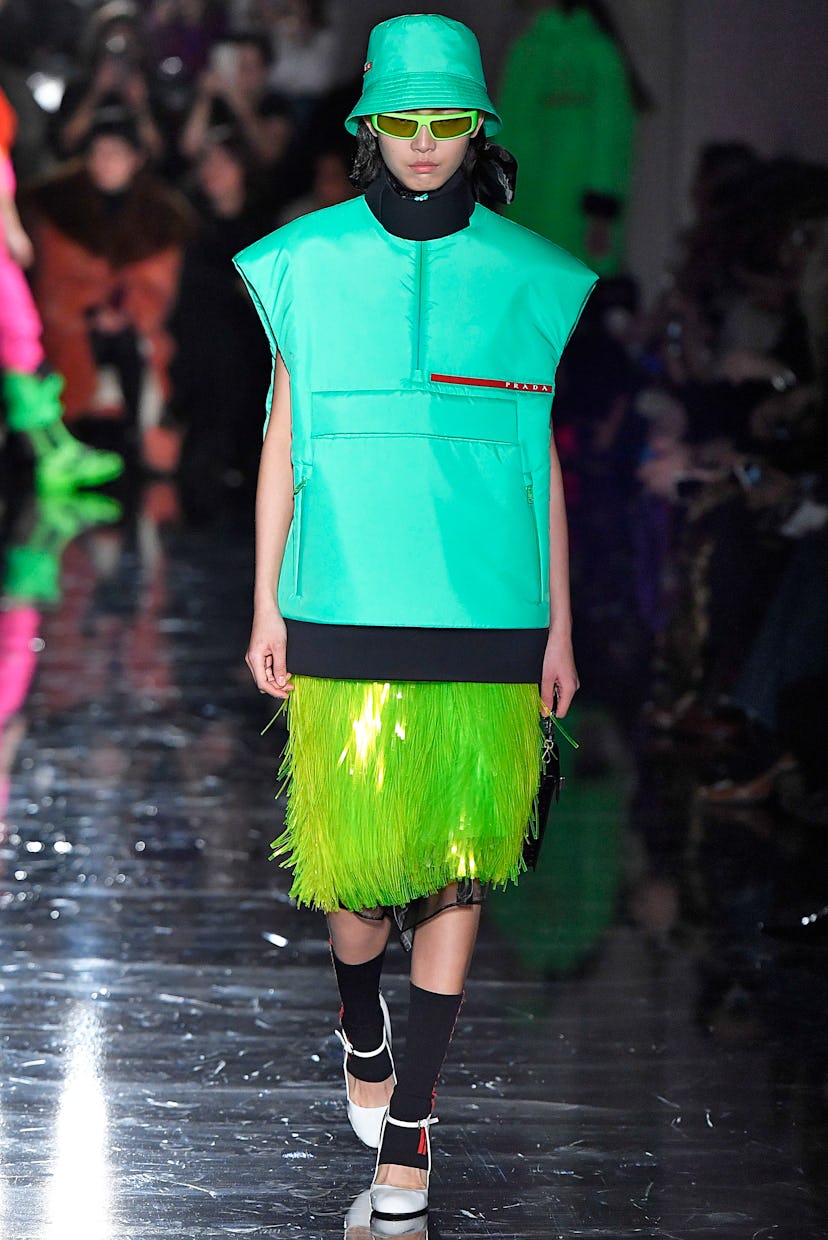How Prada Made Its Trademark Nylon Pieces Newly Sustainable
They just launched a capsule collection, Re-Nylon, using the new sustainable fabric.

Prada nylon bags and accessories have been a brand staple since 1984. Last September, the house even revamped Prada Linea Rosa, a nylon-heavy, hypebeast-ready diffusion line, and Frank Ocean just attended the 2019 Met gala fully decked out in Prada nylon. But today, the brand announced that they’re transforming the products into something sustainable.
Prada has partnered with the Italian textile yarn producer Aquafil to use the manufacturer’s sustainable nylon, Econyl, a fabric that can be recycled over and over again. Econyl is made from previously used nylon and plastic and textile waste. Prada plans to convert all of its virgin nylon into Econyl by 2021, and in the meantime they’ve launched a new capsule collection, Re-Nylon, consisting of six classic Prada nylon bags made from the environmentally friendly material. The collection includes a tote, a duffle, two backpacks, a shoulder bag, and a belt bag (aka fanny pack), with a reworked Prada logo that incorporates the classic signal for recycling, a looped arrow. Partnering with UNESCO, Prada will donate an undisclosed percentage of sales to an upcoming project related to sustainability.
“A vital component of Prada’s heritage and a hallmark of its approach to contemporary fashion—a challenging of convention, an elevation of utilitarian materials to fashion, a new form of luxury—nylon is an emblem of the brand,” a statement from Prada reads. “This project is an evolution of a fundamental code of Prada, a reinvention of heritage. Yet, in the same way, a forward-thinking ethos is intrinsic to the cultural make-up of Prada: invention, experimentation, progress. A revolutionary new material, a radical new proposal, to reinvent our past.”
The creation of Econyl goes hand in hand with the recent decision from Prada and sister line Miu Miu to go fur-free. “This project highlights our continued efforts toward promoting a responsible business,” said Lorenzo Bertelli, Prada’s head of marketing and communication.
Recycling nylon is one of the most environmentally responsible choices brands can make. According to a 2009 study from the Food and Agriculture Organization of the United Nations, nylon fibers account for 10 percent of ocean debris, a mix of residue from clothing, carpeting, packaging, and fishing nets. But it’s a challenge. Nylon melts at a lower temperature than materials like metal or glass, meaning that some bacteria can remain during the recycling process; in order to be useful, the fabric needs to be cleaned over and over again.
The best available option is to reuse the fabric rather than create virgin nylon, which is why Aquafil developed Econyl in 2007. In an interview for a feature in The Guardian on recycled nylon, the Aquafil CEO Giulio Bonazzi said that “after nearly 40 years of producing carpet yarn, a growing awareness of the environmental harm caused by synthetic materials made him want to turn towards a more environmentally friendly business model.” Aquafil went on to sell Econyl to brands like Outerknown; legendary surfer Kelly Slater’s sustainable outerwear company, Speedo; and now Prada.
“This is really the future of manufacturing,” David Stover, a cofounder of the recycled nylon brand Bureo, told The Guardian. “We have to start reassessing waste as value.… Nylon is just one material in our lives. Imagine if we did this for all the materials we use.”